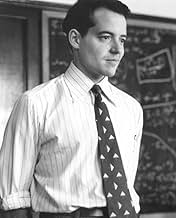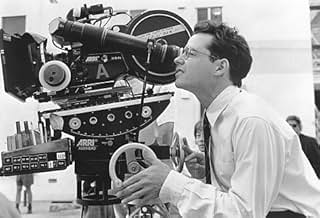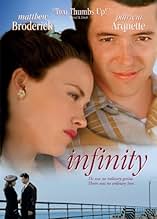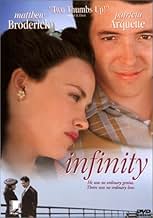IMDb RATING
6.2/10
2.1K
YOUR RATING
Story of the early life of genius and Nobel Prize-winning physicist Richard Feynman.Story of the early life of genius and Nobel Prize-winning physicist Richard Feynman.Story of the early life of genius and Nobel Prize-winning physicist Richard Feynman.
- Director
- Writers
- Stars
Raffi Di Blasio
- Robert
- (as Raffi DiBlasio)
Josh Keaton
- David
- (as Joshua Wiener)
- Director
- Writers
- All cast & crew
- Production, box office & more at IMDbPro
Featured reviews
This was a very worthy project of the Brodericks, mother and son, and one which I would have liked to have tackled myself, having read and greatly enjoyed both "Surely You're Joking, Mr. Feynman!" and "What Do You Care What Other People Think?". To concentrate on the deep love story between Feynman and his first wife Arline, which coincided with his work on the Manhattan Project at Los Alamos, was, I feel, a good filmic move in order to give the story an anchor (not to mention the fact that it truly is one of the most romantic real love stories I've ever heard of). Every movie adaptation has to make sacrifices, and this one obviously had to sacrifice all the other interesting stuff that happened to Feynman in the years after the war. So I don't have a problem with the quality of the script, and they also had a big enough budget to get the period feel.
However, this film falls down in a major way on the characterisation of its lead character. Surprisingly, for Broderick is not a bad actor, he just comes across as being Broderick - a good looking young man who can look lovingly at Patricia Arquette and add a bit of passion to his voice when explaining complicated physics. But we've all seen the real Feynman on television and in film - he was LARGER than life! He was intensely charismatic, a brilliant expositor of scientific ideas and a great teacher.
It seems to me that instead of succumbing to the temptation of directing, that Broderick should really have got someone else direct, so that he could concentrate on really getting inside the head of Feynman and reproducing on screen some of that charisma - something I'm quite sure Broderick is capable of doing.
So ultimately this is a missed opportunity. You learn some of the facts about what happened, but you don't really meet the real Richard P. Feynman.
However, this film falls down in a major way on the characterisation of its lead character. Surprisingly, for Broderick is not a bad actor, he just comes across as being Broderick - a good looking young man who can look lovingly at Patricia Arquette and add a bit of passion to his voice when explaining complicated physics. But we've all seen the real Feynman on television and in film - he was LARGER than life! He was intensely charismatic, a brilliant expositor of scientific ideas and a great teacher.
It seems to me that instead of succumbing to the temptation of directing, that Broderick should really have got someone else direct, so that he could concentrate on really getting inside the head of Feynman and reproducing on screen some of that charisma - something I'm quite sure Broderick is capable of doing.
So ultimately this is a missed opportunity. You learn some of the facts about what happened, but you don't really meet the real Richard P. Feynman.
For fans of Feynman's books, this will be a disappointment. Matthew Broderick's performance doesn't capture the fire, playfulness and wonder of Feynman's personality (as do documentaries of his lectures). Furthermore, his direction botches many of the anecdotes, missing the points of emphasis and undermining the quirky humour and sense of irony in the original telling. For example, in the Chinese abacus scene (which is shifted to a much earlier period in Feynman's life), Broderick has Feynman initiate the challenge, whereas in real life, it was the hapless abacus salesman who challenged him, completely unaware that he was taking on a renowned physicist. Therefore, the sense of irony, and of Feinman's idiosyncrasy in the world of mere mortals, is lost. Only Patricia Arquette seems to have captured the essence of the memoirs, despite her often unintelligible dialogue.
A caution: this review reveals details of the movie.
The movie "Infinity", stars Matthew Broderick who portrays the Nobel-prize-winning physicist Richard Feynman. Broderick also co-produced and directed the movie. Keeping it in the family, the screenplay was written by Matthew's mother, Patricia Broderick. The other major role, that of Feynman's first wife Arline Greenbaum, was played by Patricia Arquette.
Infinity is not a documentary about a phase in the life of Feynman the scientist, my expectation. My first impression as the movie unfolded was disappointment. I have been intrigued by Feynman the physicist and scientist since I purchased his Quantum Mechanics lectures trilogy in 1968. As the movie progressed, I saw that it isn't a movie about science; it is a movie about the heart. The point of this movie is to portray Feynman the person, and his relationship to the love of his life, Arline Greenbaum; in this it succeeds wonderfully.
A few years back, while reading one of Feynman's books, I ran across a passage which made a big impression. Feynman wrote that his children, who were raised in private schools and visited home only during holidays, were known well enough to him that if he were to meet one on the street, he would probably recognize that person as his child. That statement helped convince me to move from academia to the business world, making becoming a better father and husband my top priority. After seeing this movie, I better understand Feynman the person. The tragic loss of his first wife probably produced a life-long desire to hold personal relationships at a distance, and to make research and teaching his top priorities.
Broderick does an impressive job of directing the film. Just one example: at the moment of the death of his wife, my expectation was for there to be intrusive weepy violins. Instead, the moment moved through silence, making a more powerful statement. That scene reminded me of George Burns pulling down his shoe box of old photos from the top shelf of his closet, and looking at them quietly in "Going in Style", a scene which packed an emotional punch without resorting to violins.
There is another dimension to the two Brodericks' intelligence which surprised me: they did not botch the physics, what little there was. Nearly every Hollywood movie which has an opportunity to do so, gets the science wrong... having space ships produce impressive sounds as they move through the vacuum of space, for example. Matthew Braderick as Feynman explains beta decay to his wife using olives from his lunch in an approach worthy of the real Feynman. Also, Feyman's father explanation of inertia, in which he differentiated between being able to name it and describe it, which he could do, and understanding the "why" of it, which no one could do, was a "deep" understanding of science which Broderick portrayed with sympathy and understanding. By staying away from complex mathematics and the physics that could have been incorporated into this story, to the delight of the geeks of the world, Broderick created a movie that is accessible to all.
"Infinity" is a gem of a small movie, a love story, a true story, told with gentleness and feeling; a movie which does not overreach itself. I strongly recommend it.
The movie "Infinity", stars Matthew Broderick who portrays the Nobel-prize-winning physicist Richard Feynman. Broderick also co-produced and directed the movie. Keeping it in the family, the screenplay was written by Matthew's mother, Patricia Broderick. The other major role, that of Feynman's first wife Arline Greenbaum, was played by Patricia Arquette.
Infinity is not a documentary about a phase in the life of Feynman the scientist, my expectation. My first impression as the movie unfolded was disappointment. I have been intrigued by Feynman the physicist and scientist since I purchased his Quantum Mechanics lectures trilogy in 1968. As the movie progressed, I saw that it isn't a movie about science; it is a movie about the heart. The point of this movie is to portray Feynman the person, and his relationship to the love of his life, Arline Greenbaum; in this it succeeds wonderfully.
A few years back, while reading one of Feynman's books, I ran across a passage which made a big impression. Feynman wrote that his children, who were raised in private schools and visited home only during holidays, were known well enough to him that if he were to meet one on the street, he would probably recognize that person as his child. That statement helped convince me to move from academia to the business world, making becoming a better father and husband my top priority. After seeing this movie, I better understand Feynman the person. The tragic loss of his first wife probably produced a life-long desire to hold personal relationships at a distance, and to make research and teaching his top priorities.
Broderick does an impressive job of directing the film. Just one example: at the moment of the death of his wife, my expectation was for there to be intrusive weepy violins. Instead, the moment moved through silence, making a more powerful statement. That scene reminded me of George Burns pulling down his shoe box of old photos from the top shelf of his closet, and looking at them quietly in "Going in Style", a scene which packed an emotional punch without resorting to violins.
There is another dimension to the two Brodericks' intelligence which surprised me: they did not botch the physics, what little there was. Nearly every Hollywood movie which has an opportunity to do so, gets the science wrong... having space ships produce impressive sounds as they move through the vacuum of space, for example. Matthew Braderick as Feynman explains beta decay to his wife using olives from his lunch in an approach worthy of the real Feynman. Also, Feyman's father explanation of inertia, in which he differentiated between being able to name it and describe it, which he could do, and understanding the "why" of it, which no one could do, was a "deep" understanding of science which Broderick portrayed with sympathy and understanding. By staying away from complex mathematics and the physics that could have been incorporated into this story, to the delight of the geeks of the world, Broderick created a movie that is accessible to all.
"Infinity" is a gem of a small movie, a love story, a true story, told with gentleness and feeling; a movie which does not overreach itself. I strongly recommend it.
I first caught most of this film on T.V. I love Matthew Broderick, so I stopped to watch it. I was totally engrossed in this story, and couldn't pry myself away. It is a complicated movie, but I think Broderick did a wonderful job acting and directing. I think the thing that most captured me is not the story, but of how Broderick portrayed, Feyneman. His expressions represent his character better than any words spoken in the film. Broderick portrayed his character extremly well. He showed a man who was complicated and had many tough decisions to make, and did it to the best of his ability. On this alone, I give Infinity a 10 out of 10.
Most of this movie concentrates on the life of Nobel Prize physicist Richard Feynman (born in 1918), roughly from age twenty to twenty-seven. During this time he got his Ph.D. from Princeton and participated in the Manhattan Project. Also in that time frame he met and married Arline Greenbaum. There are a couple of scenes, with Feynman being around the age of six, that establish his inquiring mind and his relationship with his father, but the main thrust of the movie details the relationship between Richard and Arline.
Having read Feynman's books "Surely You're Joking Mr. Feynman" and "What Do You Care What Other people Think," as well as having viewed several of his videos on YouTube, I felt that this movie did not capture what I perceive as Feynman's impishness and openness. Maybe this was because during the time period covered Feynman was dealing not only with his early career challenges but also with the serious health problems of Arline. I thought the movie did a good job of detailing how Feynman coped with the difficult conflict between his professional ambitions and his love and devotion to Arline.
I suppose most people's image of the 1940s comes from looking at bleached out color photos and videos from that time. Whoever decided on the lighting for this movie must have been under the impression that that is what things looked like at the time, since there seems to be some sepia-toned cast to much of the film. I suppose the desire was to add some sense of nostalgia for a past era, but I found the rather dark filming fosters an overall fogginess.
Feynman's academic career was glossed over with there being little desire to inform the audience as to what his scientific interests were. There was no mention of what his contributions were to the Manhattan Project, or why he was chosen to go to Los Alamos. There was some odd editing like the insertion early on of a hand tossing out small pieces of paper from atop a wooden post. After the atomic blast at Alamogordo there is a scene of Fermi doing some measurements of how the pieces of paper were scattered in order to estimate the power of the blast, but this was not made clear enough for most people to make the appropriate deduction. Also, the movie has Feynman looking at the atomic blast with unaided eyes which would have caused retinal burns.
The score tries to be manipulative, but winds up being intrusive. Every time there is a tender moment some sappy music is played.
I wish this movie could have given more of a hint of Feynman's being a witty, free-spirited genius, which I think he was.
Having read Feynman's books "Surely You're Joking Mr. Feynman" and "What Do You Care What Other people Think," as well as having viewed several of his videos on YouTube, I felt that this movie did not capture what I perceive as Feynman's impishness and openness. Maybe this was because during the time period covered Feynman was dealing not only with his early career challenges but also with the serious health problems of Arline. I thought the movie did a good job of detailing how Feynman coped with the difficult conflict between his professional ambitions and his love and devotion to Arline.
I suppose most people's image of the 1940s comes from looking at bleached out color photos and videos from that time. Whoever decided on the lighting for this movie must have been under the impression that that is what things looked like at the time, since there seems to be some sepia-toned cast to much of the film. I suppose the desire was to add some sense of nostalgia for a past era, but I found the rather dark filming fosters an overall fogginess.
Feynman's academic career was glossed over with there being little desire to inform the audience as to what his scientific interests were. There was no mention of what his contributions were to the Manhattan Project, or why he was chosen to go to Los Alamos. There was some odd editing like the insertion early on of a hand tossing out small pieces of paper from atop a wooden post. After the atomic blast at Alamogordo there is a scene of Fermi doing some measurements of how the pieces of paper were scattered in order to estimate the power of the blast, but this was not made clear enough for most people to make the appropriate deduction. Also, the movie has Feynman looking at the atomic blast with unaided eyes which would have caused retinal burns.
The score tries to be manipulative, but winds up being intrusive. Every time there is a tender moment some sappy music is played.
I wish this movie could have given more of a hint of Feynman's being a witty, free-spirited genius, which I think he was.
Did you know
- TriviaThe gate scene at Los Alamos is accurate and Richard had many more pranks that he pulled while working there. Most notably he picked locks. The one unique combination of locks was a series of file cabinets in a mathematicians office where the combinations began with the first few digits of the natural logarithm of e.
- Crazy creditsThe film has a 1997 copyright date in the credits, despite being released in 1996.
- SoundtracksUgly Chile (You're Some Pretty Doll)
Written by Clarence Williams
Published by Shapiro, Bernstein & Co., Inc. (ASCAP)
Copyright renewed
- How long is Infinity?Powered by Alexa
Details
- Release date
- Country of origin
- Official site
- Language
- Also known as
- Oändlig kärlek
- Filming locations
- Production companies
- See more company credits at IMDbPro
Box office
- Gross US & Canada
- $195,170
- Opening weekend US & Canada
- $78,976
- Oct 6, 1996
- Gross worldwide
- $195,170
- Runtime
- 1h 59m(119 min)
- Color
- Sound mix
- Aspect ratio
- 1.66 : 1
Contribute to this page
Suggest an edit or add missing content































